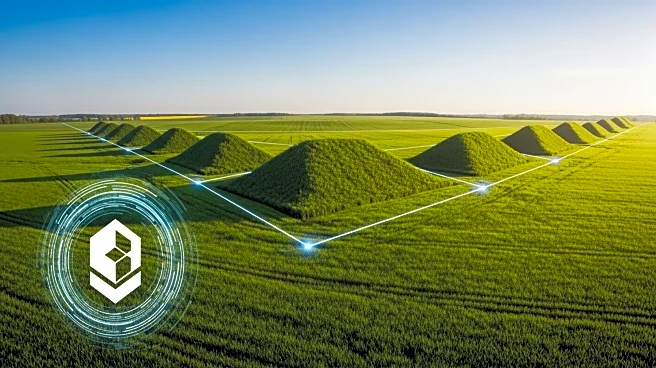What is the story about?
What's Happening?
The Blockchain in Agriculture and Food Supply Chain Market is projected to experience significant growth, driven by increasing demand for transparency, traceability, and food safety. Key players such as IBM, Microsoft, and SAP-SE are leading the adoption of blockchain technology to reduce fraud, enhance trust, and improve logistics and provenance tracking. The market, valued at USD 391.53 million in 2024, is expected to grow to USD 8,402.14 million by 2032, with a CAGR of 41.94%. The adoption is fueled by regulatory compliance, consumer demand for ethical sourcing, and digital transformation in agri-tech.
Why It's Important?
The rapid growth of blockchain technology in agriculture and food supply chains is crucial for enhancing transparency and trust in these sectors. By providing secure and immutable records, blockchain can significantly reduce fraud and improve the efficiency of logistics and tracking systems. This technology also supports regulatory compliance and meets consumer demands for ethical sourcing, which are increasingly important in today's market. The widespread adoption of blockchain could lead to more sustainable and efficient food supply chains, benefiting both producers and consumers.
What's Next?
As blockchain technology continues to gain traction, stakeholders in the agriculture and food supply chain sectors will need to invest in infrastructure and training to fully leverage its benefits. Future developments may include the integration of blockchain with other emerging technologies, such as IoT and AI, to further enhance supply chain efficiency and transparency. Additionally, regulatory bodies may introduce new standards and guidelines to ensure the responsible use of blockchain in these industries.
Beyond the Headlines
The adoption of blockchain in agriculture and food supply chains represents a shift towards more sustainable and ethical business practices. By enabling greater transparency and traceability, blockchain can help address issues such as food fraud and waste, contributing to global food security. Furthermore, the technology's potential to streamline operations and reduce costs could lead to increased competitiveness and innovation in the agri-tech sector.
















